I am not sure how old I was when I first read the Golden Compass, but 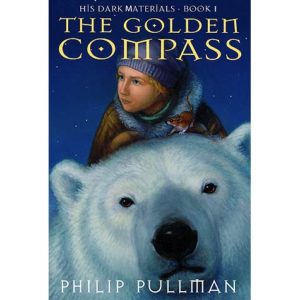 looking at the impacts it had on my early life, I must have been around six or seven. In retrospect this seems early, but I grew up following around a big sister four years my senior, and insisting that I read whatever she did, no matter the suggested age. We got it on audiobook, a favorite medium of our family (my mother had figured out when I was a baby that if she turned on an audio very low when she tucked us in, we would have to lie very still and quiet to be able to hear it, and we would quickly fall asleep). I still have that audio on my bookshelf, it is a full cast production, with narration by the author, and Phillip Pullman’s voice still makes me sleepy.
looking at the impacts it had on my early life, I must have been around six or seven. In retrospect this seems early, but I grew up following around a big sister four years my senior, and insisting that I read whatever she did, no matter the suggested age. We got it on audiobook, a favorite medium of our family (my mother had figured out when I was a baby that if she turned on an audio very low when she tucked us in, we would have to lie very still and quiet to be able to hear it, and we would quickly fall asleep). I still have that audio on my bookshelf, it is a full cast production, with narration by the author, and Phillip Pullman’s voice still makes me sleepy.
By now it is a familiar tale, but no less beloved or relevant as I age. As a child (and still today) I was drawn to its epic fantasy adventure with characters deeper and more relatable than Lord of the Rings, and its sci-fi/steampunk world more complex and well-built than Narnia (two of my other childhood favorites). But I think what I really loved— and still do— was how Phillip Pullman wove more real world themes into the narrative in a way that children could understand. The trilogy starts with the main character, Lyra Belacqua, as a child of around twelve, and yet the books do not shy away from tackling complex and controversial discussions of politics, science, organized religion, and their intersections. More importantly, amid its fantastical adventure, it does so in a way that younger readers can understand. That, I think, is the beauty of the Golden Compass. Even though it was written by an older man, I could relate strongly to the main character. Even when talking about difficult and controversial subjects, I understood— and more importantly, I felt like I was being talked to in a way that was respectful to me.
The Golden Compass is unique in children’s literature in that it gives its readers the information about what is happening, and the tools with which to decipher that information, without becoming a lecture. Through Lyra and her journey, the reader is invited to think critically, and to draw the parallels between her world and our own. It guides its readers along, while still making them feel that their own opinions are valid. As a child, that feeling of being heard, of being given the opportunity to have a discussion and not a lesson, of being encouraged to question authority and form one’s own views, is all too rare. I was lucky in that I was raised in a family that believed in explaining it decisions, even when my sister and I were very young, and I recognized that same way of thinking in Philip Pullman’s storytelling.
It is these same reasons that make His Dark Materials such a masterpiece, that make it so hard to make an adaptation. Even under the best of circumstances, adaptions are hard to make— there are elements of books that don’t translate well into onscreen storytelling. When a book is as beloved and as controversial as Pullman’s that difficulty is twofold. Going into the 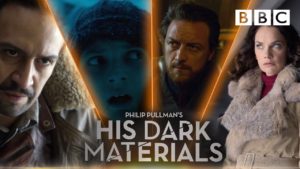 HBO/BBC series adaptation, I had high hopes. Streaming services like Hulu, Netflix and HBO have been instrumental in making adaptations of books with more progressive or controversial themes, since they don’t require as great a mass approval as in-theater movies do in order to be considered successful. His Dark Materials, of course, is by its very nature controversial, and I had hoped that HBO would tackle the issues that the books do with the nuance and narrative that Pullman originally wrote.
HBO/BBC series adaptation, I had high hopes. Streaming services like Hulu, Netflix and HBO have been instrumental in making adaptations of books with more progressive or controversial themes, since they don’t require as great a mass approval as in-theater movies do in order to be considered successful. His Dark Materials, of course, is by its very nature controversial, and I had hoped that HBO would tackle the issues that the books do with the nuance and narrative that Pullman originally wrote.
Sadly, when I watched the pilot episode, I was rather disappointed. There was so much potential, so much space for the story to become more fully developed than it did in the ill fated movie. But it was not to be. The first episode managed to be both the kind of storytelling that has you checking to see how much longer is left, and the kind that feels incredibly rushed. 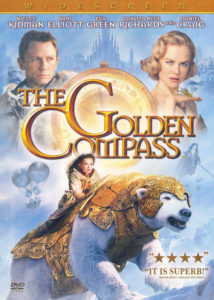 Unpopular opinion: I thought the movie, for all its issues, was much better. The first mistake the HBO show made was in stretching itself too thin, trying to cram in too many moments and references from the books without stopping to create an environment in which its watchers could really get to know the characters (especially since several fairly major changes were made to said characters). The result was that there was no emotional connection to the characters, or really much between the characters themselves. In the books, Lyra has a thriving community of other young miscreants that run around making alliances and having wars in the river mud, and she has a somewhat unorthadox sort of family in the scholars and staff of Jordan College. In the books Lyra has a home there, and people she cares for, which is one of the main reasons that she goes on the journey she does in the first place. Those relationships we see in the early chapters serve as an anchor for Lyra and her story, and with the trivialization or elimination of those relationships, I am afraid that the story as a whole will suffer as it goes forwards.
Unpopular opinion: I thought the movie, for all its issues, was much better. The first mistake the HBO show made was in stretching itself too thin, trying to cram in too many moments and references from the books without stopping to create an environment in which its watchers could really get to know the characters (especially since several fairly major changes were made to said characters). The result was that there was no emotional connection to the characters, or really much between the characters themselves. In the books, Lyra has a thriving community of other young miscreants that run around making alliances and having wars in the river mud, and she has a somewhat unorthadox sort of family in the scholars and staff of Jordan College. In the books Lyra has a home there, and people she cares for, which is one of the main reasons that she goes on the journey she does in the first place. Those relationships we see in the early chapters serve as an anchor for Lyra and her story, and with the trivialization or elimination of those relationships, I am afraid that the story as a whole will suffer as it goes forwards.
In addition, in the movie at least, even if it deviates from the book quite a bit more than the show does in its early stages, the characters felt intrinsically right. In both adaptations Lyra is shown as the sort of wild child that runs around getting into trouble and causing mischief, but the movie’s Lyra was far truer in spirit to her book counterpart. The movie’s Lyra (Dakota Blue Richards) 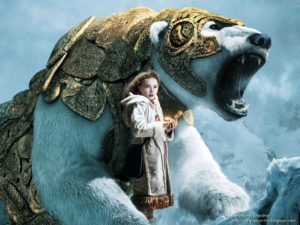 captured the beloved character’s fierce independence, her curiosity and creativity, and her magnetic personality that makes her a leader of other children in Oxford, and later at Bolvangar. While there was nothing exactly wrong with the show’s Lyra (Dafne Keen) she is a bit off. Maybe it is because she is portrayed as a bit more clingy towards her uncle. Maybe it is because we don’t see her having the kind of adventures that we do in the books and the movie. Maybe it is simply because there is a bigger emotional disconnect in the show. Whatever the reason,
captured the beloved character’s fierce independence, her curiosity and creativity, and her magnetic personality that makes her a leader of other children in Oxford, and later at Bolvangar. While there was nothing exactly wrong with the show’s Lyra (Dafne Keen) she is a bit off. Maybe it is because she is portrayed as a bit more clingy towards her uncle. Maybe it is because we don’t see her having the kind of adventures that we do in the books and the movie. Maybe it is simply because there is a bigger emotional disconnect in the show. Whatever the reason, 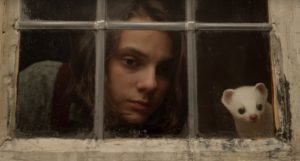 HBO’s Lyra just doesn’t quite have that quality that makes you instantly root for her, and it unmoors the entire story.
HBO’s Lyra just doesn’t quite have that quality that makes you instantly root for her, and it unmoors the entire story.
The other issues I had with it are perhaps more nitpicky, the CGI wasn’t great, the messages that are woven into the narrative of the book are, in the show, shoved in your face (a flaw the movie shares), but still, it could be worse. Critics who have access to further episodes say that it picks up around episode four, but when each episode is an hour long, that is quite a wait. It very well may be that His Dark Materials is just one of those fandoms that keeps getting its hopes raised and then crashed by a series of adaptations that just cannot compare to the original material. Regardless, if you haven’t read the books I urge you to do so, or if you’ve only read the original trilogy to take a look at the new books (they are still about Lyra, don’t worry) La Belle Savage, and The Secret Commonwealth.
Bookshop Santa Cruz Teen Book Crew
Teen Views on Books
